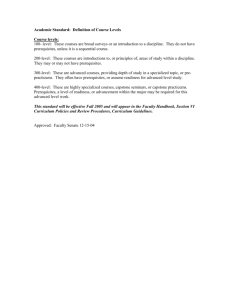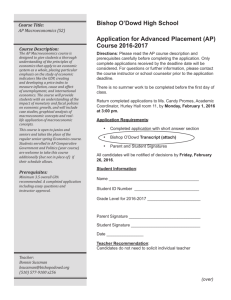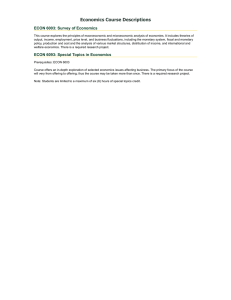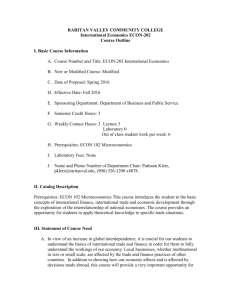DEPARTMENT OF ECONOMICS COURSE OFFERINGS--FALL 2016 ECON2209
advertisement
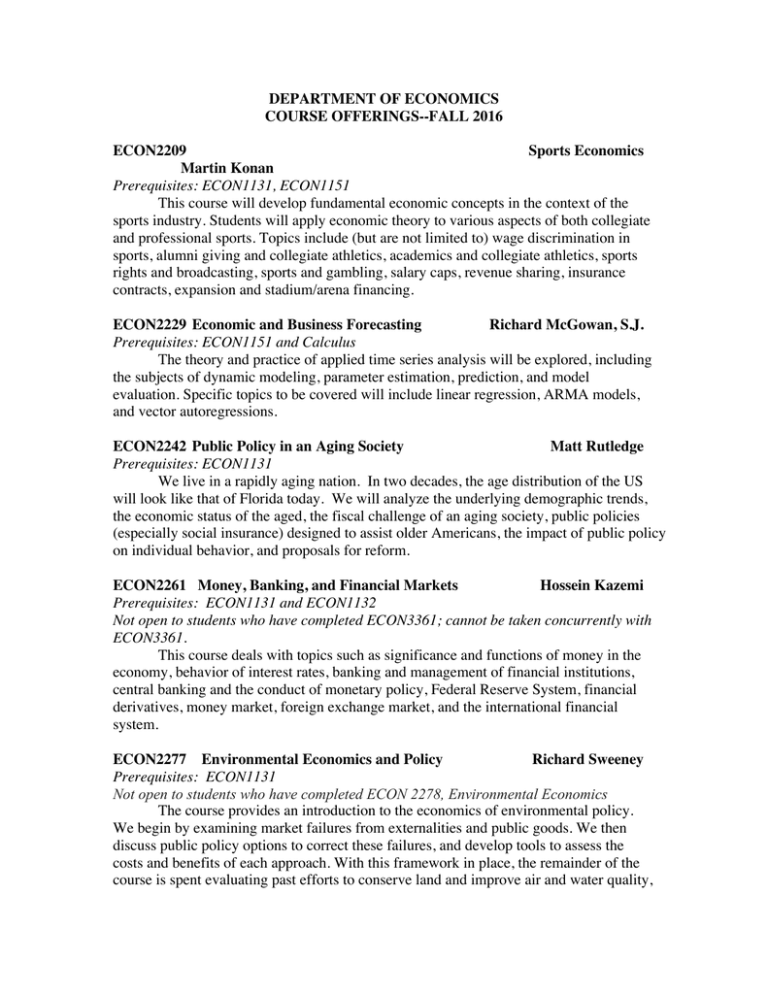
DEPARTMENT OF ECONOMICS COURSE OFFERINGS--FALL 2016 ECON2209 Sports Economics Martin Konan Prerequisites: ECON1131, ECON1151 This course will develop fundamental economic concepts in the context of the sports industry. Students will apply economic theory to various aspects of both collegiate and professional sports. Topics include (but are not limited to) wage discrimination in sports, alumni giving and collegiate athletics, academics and collegiate athletics, sports rights and broadcasting, sports and gambling, salary caps, revenue sharing, insurance contracts, expansion and stadium/arena financing. ECON2229 Economic and Business Forecasting Richard McGowan, S.J. Prerequisites: ECON1151 and Calculus The theory and practice of applied time series analysis will be explored, including the subjects of dynamic modeling, parameter estimation, prediction, and model evaluation. Specific topics to be covered will include linear regression, ARMA models, and vector autoregressions. ECON2242 Public Policy in an Aging Society Matt Rutledge Prerequisites: ECON1131 We live in a rapidly aging nation. In two decades, the age distribution of the US will look like that of Florida today. We will analyze the underlying demographic trends, the economic status of the aged, the fiscal challenge of an aging society, public policies (especially social insurance) designed to assist older Americans, the impact of public policy on individual behavior, and proposals for reform. ECON2261 Money, Banking, and Financial Markets Hossein Kazemi Prerequisites: ECON1131 and ECON1132 Not open to students who have completed ECON3361; cannot be taken concurrently with ECON3361. This course deals with topics such as significance and functions of money in the economy, behavior of interest rates, banking and management of financial institutions, central banking and the conduct of monetary policy, Federal Reserve System, financial derivatives, money market, foreign exchange market, and the international financial system. ECON2277 Environmental Economics and Policy Richard Sweeney Prerequisites: ECON1131 Not open to students who have completed ECON 2278, Environmental Economics The course provides an introduction to the economics of environmental policy. We begin by examining market failures from externalities and public goods. We then discuss public policy options to correct these failures, and develop tools to assess the costs and benefits of each approach. With this framework in place, the remainder of the course is spent evaluating past efforts to conserve land and improve air and water quality, before concluding with an extensive discussion about global climate change policy. ECON3305 Market Design Department Prerequisites: MATH1100 and ECON2201 or ECON2203 This course provides game theoretic analysis of the matching individuals with other individuals or items, typically across two sides, as in marriage, university placement, employment, housing. The objective of the course is to introduce the students to models on matching theory and analyses of markets and institutions where matchings take place. Market design applications of matching theory such as school choice and kidney exchange will be analyzed. ECON3308 Game Theory Chris Maxwell Prerequisites: ECON2201 or ECON2203 This course is an introduction to game theory. Game theory consists of a coherent set of concepts and analytical tools to examine interactive or strategic situations between people, that is, situations where the well being of one actor depends not only what s/he does but also on what others do. Hence in deciding how best to act, each person needs to consider how others are likely to act as well. Game theory has become a widely used tool of analysis in a wide range of disciplines, including economics, business, political science, law and international relations. ECON3310 Behavioral Economics Elif Sisli Ciamarra Prerequisites: ECON2201 or ECON2203 The field of behavioral economics tries to explain so-called anomalies that we observe in the markets’ apparent mis-pricings and inefficiencies that are not consistent with the classical economic models of rational behavior. In this course, we will characterize some prevalent features of irrational behavior in the markets. We will discuss typical errors made by market participants as a result of behavioral biases, and examine the extent to which irrationality can affect markets at the aggregate level. ECON3316 The Economics of Refugees and Economic Migrants Mathis Wagner Prerequisites: ECON2201 or ECON2203. Knowledge of Statistics and Econometrics are helpful but not required. This course will provide a thorough introduction to the economic thinking on the worldwide impact of refugees and economic migrants. It will address both the economic challenges and opportunities presented by the global migration of people. Specific emphasis will be given to the current refugee crisis, the impact of migrants on wages and employment, and their role in knowledge creation and the impact of ‘brain drain’. ECON3331 Distributive Justice Uzi Segal Prerequisites: ECON2201 or ECON2203 The course will analyze modern analysis of justice and fairness. We will discuss bargaining situations and social choice questions. Part of the course will be devoted to the recent experimental literature regarding fairness. Limited enrollment. Significant writing/research component. Please note this course requires a strong conceptual understanding of Micro Theory. ECON3340 Labor Economics Rand Ghayad Prerequisites: ECON2201 or ECON2203 (may be taken concurrently) This course will introduce students to the methodology of labor economics from the neo-classical perspective. The principal emphasis will be on neo-classical theory and empirical work dealing with the supply and demand for labor; the operation of the labor market; the determination of wages, and the impact of trade unions and collective bargaining. Special emphasis will be placed on applications of theory and empirical findings to policy questions. ECON3354 Advertising and Media Markets: Advanced Research Methods Julie Holland Mortimer Prerequisites: ECON2201and 1151. Econometrics required but may be taken concurrently This course develops advanced research methods to study the advertising and media markets. The goal of the course is to provide hands-on experience with advanced research methods, including the ability to analyze and critique previous research and to identify important research questions. The course is designed primarily for junior economics majors who are interested in writing a senior thesis, or for junior and senior economics majors anticipating quantitative work in economics or marketing after graduation. Methods that are taught include theoretical tools from industrial organization, such as game theoretic models of imperfect competition, pricing, and entry, as well as statistical and empirical methods of analysis using data on advertising and media programming choices. Questions addressed in the course include the following: What is the impact of advertising on product markets? How do advertisers compete for air time, both across and within industries? ECON3358 Industrial Organization, Creation, and Strategy Tracy Regan Prerequisites: ECON2201 or ECON2203 This course is designed as an introduction to industrial organization with special emphasis on entrepreneurship and strategy. We will discuss various types of market structures and business methods. The lectures will largely be theoretical (i.e. mathematical) but also include discussions of real-world firms and industries. A working knowledge of microeconomic theory and comfort with basic calculus are necessary for success in the class. A series of guest lecturers will present first-hand accounts of their experience as entrepreneurs/small-business owners. Students will work in groups to read and present popular press, non-fiction books on various techniques and approaches to business. The semester will conclude with the student groups presenting a business plan for a new start-up company. ECON3361 Monetary Theory & Policy Hossein Kazemi Chris McHugh Prerequisites: ECON2202 or ECON2204 and ECON2228 This course is an analysis of the operation and behavior of financial markets and financial institutions. Emphasis is placed on financial intermediaries, including commercial banks, and the central bank. The money supply process and alternative theories of the demand for money are considered, as well as their implications for monetary policy and macroeconomic performance. ECON3363# Micro Public Policy Issues Joseph Quinn Prerequisites: ECON2201 or ECON2203 This is a seminar on the economic analysis of current microeconomic public policy issues. During the first half of the course, students will read and discuss articles on selected topics (from the syllabus), and prepare first drafts of papers on topics of their own choice. The second half of the course will be run like a professional economics conference. Students will read and critique others' papers, present their own drafts to the class, and then revise their own papers on the basis of the comments received. ECON3365 Public Finance Anthony Laramie Mark Kazarosian Richard Tresch Prerequisites: ECON2201 or ECON2203 (may be taken concurrently) This is a course in the microeconomics of the public sector. We will discuss the rationale for the government's role in a market economy, major expenditure programs, and the theory and structure of the tax system. The focus will be on the federal (as opposed to state and local) government's expenditure and tax programs, with special attention given to topics of current concern. ECON3372 International Finance Rosen Valchev Bruce Watson Prerequisites: ECON2201 and ECON2202 International financial markets, international trade and balance of payments issues will be studied by using analytical models of the open economy. Topics of particular interests are exchange rate determination, capital flows, trade flows, and other international linkages between economies. The course will apply the analytical tools of international economics to address macroeconomic aspects of current policy issues such as the global impact of the financial crisis, exchange rate policy, sovereign debt crises, and persistent trade deficits and international indebtedness. ECON3373# Impact Evaluation in Developing Countries Paul Cichello Prerequisites: ECON2201 and ECON2228 The course reviews advanced econometric techniques and research designs used to estimate the causal effect of programs or policies implemented in developing countries. Fixed effects, difference-in-difference, instrumental variable, and propensity score methods are discussed as are regression discontinuity, natural experiment, and randomized experiment designs. The economic rationale for such programs is also addressed. Topic areas include health, education, service delivery, insurance, and micro-finance. ECON3374#+ Development Economics and Policy Anukriti Prerequisites: ECON2201, ECON2202, and ECON2228 This course examines development economics and development policy. The purpose is to understand the lives of the poor and the economies of poor countries in order to understand what—if anything—can be done to improve their lives. We will examine various theories of why some countries and groups are rich while others are not, with emphasis on understanding what changes might occur to promote development. We will consider what might be holding the poor back including: lack of infrastructure and capital, population growth, lack of education, poor health, corruption, and institutional impediments such as poorly developed or tightly constrained markets. We will examine different methods to evaluate the effects of a policy or program, and what we do, and do not, know about poverty. Students will write a paper which considers the research and economic reasoning for a particular program to help the poor by a government giving foreign aid, a developing country government, or an NGO. This course is appropriate for economics majors as well as for majors in international studies with the appropriate prerequisites. ECON3376 International Economic Relations Jim Anderson Prerequisites: ECON2201 and ECON2202 This course introduces the study of economic relations among countries. It combines material contained in ECON3371 and ECON3372, and substitutes for both those courses. Primarily designed for international studies majors, it is also appropriate for economics and other social science majors, with the proviso that the comprehensive coverage of the course implies that the workload is heavy and expectations for students are high. Topics include the determinants of trade in goods, services, and capital; the economic policies that nations use to influence such trade; the theory and practice of international macroeconomics; and problems of coordinating macroeconomic policies among countries. The course features the usefulness (and limitations) of game theory for explaining international economic interactions. ECON3380 Capital Markets Bruce Watson Prerequisites: ECON2201 or ECON2203 (may be taken concurrently) and ECON1151 Open only to A&S economics majors and minors. Valuation of assets, rates of return, measurement of earnings, finance and securities markets, risk and portfolio choice, and special problems in investment. The course is designed to give students an appreciation of the role of securities markets in the allocation of capital. It assumes some background in economics but no prior work in finance. Finance majors should not take the course since they would encounter most of the material elsewhere, and anyone who has had basic finance would find about half of the topics redundant. Regular attendance is required, and class participation is expected. Grading is based on two mid-term exams, homework problems, an investment project, and a final exam. ECON3382 Introduction to Computational Investing Tzuo Law Prerequisites: ECON2201 (ECON2203), ECON2202 (ECON2204), and ECON2228 MUST ATTEND REQUIRED 2 HOUR LAB MONDAYS 6-8. In this course we introduce the mechanics of electronic markets, visualize and analyze economic and financial data; propose, design and optimize data-driven investment strategies, write programs to automate trading using these strategies, evaluate how well the investment strategies do with real world data, and think about how economic models speak to aspects of the data. The focus of this course is on the quantitative skills of modern investing. We will implement most of what we learn in class in a simulated “real-world” investment environment. At the end of the course, we take a step back and try to understand what we have done in the context of economic models. To accomplish this, we spend the first two thirds of the course getting our hands dirty with a lot of applied work. In the final third, we try to understand what we have done through the lens of economic models. The first four to five weeks of the course introduces programming in MATLAB (an industry standard programming language). We will learn MATLAB by building financial investment tools in MATLAB. This will be challenging. The course assumes that students have never programmed before but are eager to learn how. The next four to five weeks will be dedicated to project driven work. Students implement their own investment strategies in groups. We continue learning new concepts and tools while discussing how this can be incorporated into the investment strategies. The projects must meet two checkpoints to ensure that steady progress is made. In the final three to four weeks, we will concentrate on economic models and relate them to the investment environment we have worked with. ECON3384 (Economic) Principles and Theory of Medical and Health Care Martin Konan Prerequisite: ECON2201 or ECON2203 and ECON1151 This course is designed to teach students how to use basic principles and theories of microeconomics and statistics when thinking about medical and health care issues. In the course, we will use these concepts to understand the demand for health care, the supply of health care, the health insurance market, and the role of the government in health policy. We will focus on the U.S. health care industry. The market structure and the conduct and performance of the sub-sectors that compose this industry will be covered. Private insurance, pharmaceuticals, physician services, hospital service and medical markets will be evaluated. Alternative health care systems will also be studied. ECON3389 Big Data Stefan Hoderlein Prerequisites: ECON1151 and ECON2228 Large scale data sets (“big data”) become ubiquitous across many applied areas. The goal of this course it to provide an introduction to methods that allow to deal with this situation. We focus on statistical learning techniques and high-dimension statistics, and show how they can be applied in economics and business administration. ECON3390 Applied Health Economics Sam Richardson Prerequisites: ECON2201 and ECON2228 A perennial health policy debate concerns the proper role of government in the allocation of health care. The first fundamental theorem of welfare economics states that (under certain assumptions) markets result in efficient allocations, so one might expect most economists favor minimal government involvement in allocating health care. We will begin by studying economic theories about why health care markets may be inefficient, along with the empirical evidence regarding those theories. As the course progresses, our emphasis will shift: in groups, students will use publicly-available data to write and present a research paper investigating a policy-relevant health economics question. #Enrollment limited; significant writing/research component. +Fulfills cultural diversity core requirement. For up-to-date information on Economics course offerings see http://www.bc.edu/economics

